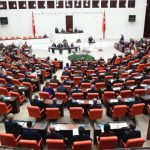Turkish President Recep Tayyip Erdoğan’s international political aspirations are preventing the country becoming a major hub for the region’s natural gas, said Nick Butler, chair of the King’s Policy Institute at King’s College London.
Erdoğan believes Turkey’s future lies in projecting the country’s status and power in a region that is dominated by cultural and religious conflict, Butler said in a commentary for the Financial Times on Monday.
That approach, which many of Erdoğan’s political rivals oppose, appears to preclude better relations with Israel and Cyprus. Improving those frayed ties, dominated by tensions over territory and ethnicity, would be needed if Turkey is to help transport gas from newly discovered fields in the eastern Mediterranean.
There are two different views prevailing in Turkey about the country’s future; the other one favouring the creation of a dominant regional economic and industrial power with a network of trading relationships reaching into Europe and beyond. That approach would seem to match the needs of Turkey’s 80 million citizens and a corporate sector now saddled with reams of foreign debt, Butler said.
“Unless Turkey changes its approach, the gas in the eastern Mediterranean will remain largely undeveloped and unexplored,” Butler said. “As a result, the region as a whole will be poorer and Turkey will have missed on a golden opportunity.”
Source: Ahval News



